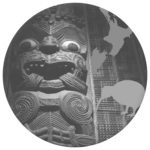
Back ثقافة نيوزيلندا Arabic Cultura de Nueva Zelanda Spanish Culture de la Nouvelle-Zélande French Cultura de Nova Zelandia Galician Cultura da Nova Zelândia Portuguese Культура Новой Зеландии Russian Văn hóa New Zealand Vietnamese 紐西蘭文化 Chinese
This article needs additional citations for verification. (January 2017) |
| Part of a series on the |
| Culture of New Zealand |
|---|
 |
The culture of New Zealand is a synthesis of indigenous Māori, colonial British, and other cultural influences. The country's earliest inhabitants brought with them customs and language from Polynesia, and during the centuries of isolation, developed their own Māori and Moriori cultures. British colonists in the 19th century brought Western culture and had a dramatic effect on the indigenous inhabitants, spreading Western religious traditions and the English language. Over time, a distinct Pākehā or New Zealand European culture emerged.
More recent immigration from the Pacific, East Asia, and South Asia has added to the cultural diversity in New Zealand. The dominant cultural influence in New Zealand remains Western, with a strong focus on democracy and egalitarianism. Māori culture continues to be an essential part of the national identity, with ongoing efforts to recognise and honour the Māori language and Māori traditions.
Ministry for Culture and Heritage showed 'that the arts and creative sector contributed $14.9 billion to New Zealand's GDP for the year ending March 2022', this is 4.2% of the total economy and is the highest since 2000 when recording began. As of March 2022, 115,000 people were primarily employed in the creative sector (32% self-employed).[1]
- ^ "Culture 101 Arts News: November 19 2023". RNZ. 19 November 2023. Retrieved 22 November 2023.